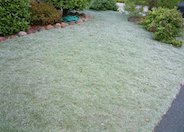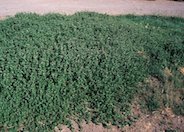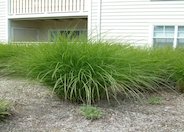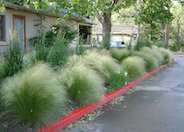
Common name:Dymondia, Rock Ditty
Botanical name:Dymondia margaretae
This foliage is gray/green/silvery; it is a very dense, mat forming ground cover. It tolerates drought, cold, salt spray and poor soils. It's deep rooted and produces small, inconspicuous yellow flowers. Rock Ditty is great for use in between stepping stones or pavers.

Common name:Lippia, Creeping Lippia
Botanical name:Phyla nodiflora
This is a ground hugging, stoloniferous, rugged subtropical groundcover. It can serve as a lawn substitute that can take some traffic, and it can be mowed. It attracts bees when it blooms. In the winter, it looks shabby.

Common name:Freeway Daisy
Botanical name:Osteospermum fruticosum
This ground cover will grow 1'-3' tall and has medium-sized, green leaves with purple or blue flowers that can bloom all year.

Common name:Maiden Grass
Botanical name:Miscanthus sinensis 'Gracillimus'
The 'Gracillimus' is a taller variety, often growing to 6'-8' tall with delicate feathery plumes and very thin graceful leaves. It should receive sun to part shade, and average to little summer watering. Tall grasses are highly combustible.

Common name:Mexican Feather Grass
Botanical name:Nassella tenuissima
This ornamental grass grows to 2' tall. It goes partially dormant during the summer but green in spring and fall. It prefers a sunny, well drained site. This plant can be invasive in some areas, so use caution. To keep reseeding to a minimum, drip irrigation will be best. Cut back in early spring to remove dormant foliage and dried seed heads. It can also tolerate dry shade. It grows to 10" wide and is the finest textured of the ornamental grasses.
| Designer: | Natural Look Driveway |
Photographer: GardenSoft |
Soils and Compost:
Practice grass-cycling by leaving short grass clippings on lawns after mowing, so that nutrients and organic matter are returned to the soil.
Integrated Pest Management:
Remove irrigation water and fertilizer from areas where you don't want weeds to grow.
